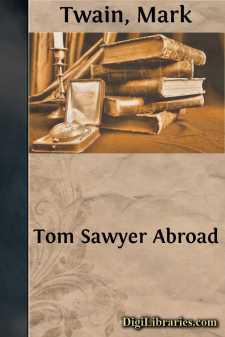Categories
- Antiques & Collectibles 13
- Architecture 36
- Art 48
- Bibles 22
- Biography & Autobiography 813
- Body, Mind & Spirit 142
- Business & Economics 28
- Children's Books 16
- Children's Fiction 13
- Computers 4
- Cooking 94
- Crafts & Hobbies 4
- Drama 346
- Education 46
- Family & Relationships 57
- Fiction 11829
- Games 19
- Gardening 17
- Health & Fitness 34
- History 1377
- House & Home 1
- Humor 147
- Juvenile Fiction 1873
- Juvenile Nonfiction 202
- Language Arts & Disciplines 88
- Law 16
- Literary Collections 686
- Literary Criticism 179
- Mathematics 13
- Medical 41
- Music 40
- Nature 179
- Non-Classifiable 1768
- Performing Arts 7
- Periodicals 1453
- Philosophy 64
- Photography 2
- Poetry 896
- Political Science 203
- Psychology 42
- Reference 154
- Religion 513
- Science 126
- Self-Help 84
- Social Science 81
- Sports & Recreation 34
- Study Aids 3
- Technology & Engineering 59
- Transportation 23
- Travel 463
- True Crime 29
Sort by:
by:
Mark Twain
In San Francisco, the other day, "A well-dressed boy, on his way to Sunday-school, was arrested and thrown into the city prison for stoning Chinamen." What a commentary is this upon human justice! What sad prominence it gives to our human disposition to tyrannize over the weak! San Francisco has little right to take credit to herself for her treatment of this poor boy. What had the child's...
more...
by:
Mark Twain
CHAPTER I Scattered here and there through the stacks of unpublished manuscript which constitute this formidable Autobiography and Diary of mine, certain chapters will in some distant future be found which deal with “Claimants”—claimants historically notorious: Satan, Claimant; the Golden Calf, Claimant; the Veiled Prophet of Khorassan, Claimant; Louis XVII., Claimant; William Shakespeare,...
more...
by:
Mark Twain
I was feeling blithe, almost jocund. I put a match to my cigar, and just then the morning's mail was handed in. The first superscription I glanced at was in a handwriting that sent a thrill of pleasure through and through me. It was Aunt Mary's; and she was the person I loved and honored most in all the world, outside of my own household. She had been my boyhood's idol; maturity, which...
more...
by:
Mark Twain
CHAPTER I. TOM SEEKS NEW ADVENTURES DO you reckon Tom Sawyer was satisfied after all them adventures? I mean the adventures we had down the river, and the time we set the darky Jim free and Tom got shot in the leg. No, he wasn't. It only just p'isoned him for more. That was all the effect it had. You see, when we three came back up the river in glory, as you may say, from that long travel,...
more...
by:
Mark Twain
THE MAN THAT CORRUPTED HADLEYBURG It was many years ago. Hadleyburg was the most honest and upright town in all the region round about. It had kept that reputation unsmirched during three generations, and was prouder of it than of any other of its possessions. It was so proud of it, and so anxious to insure its perpetuation, that it began to teach the principles of honest dealing to its babies in the...
more...
by:
Mark Twain
CHAPTER XXXVII. That Chairman was nowhere in sight. Such disappointments seldom occur in novels, but are always happening in real life. She was obliged to make a new plan. She sent him a note, and asked him to call in the evening—which he did. She received the Hon. Mr. Buckstone with a sunny smile, and said: "I don't know how I ever dared to send you a note, Mr. Buckstone, for you have the...
more...
by:
Mark Twain
Chapter XXII. A victim of treachery. Once more 'King Foo-foo the First' was roving with the tramps and outlaws, a butt for their coarse jests and dull-witted railleries, and sometimes the victim of small spitefulness at the hands of Canty and Hugo when the Ruffler's back was turned. None but Canty and Hugo really disliked him. Some of the others liked him, and all admired his pluck...
more...
by:
Mark Twain
Chapter 36 The Professor's Yarn IT was in the early days. I was not a college professor then. I was a humble-minded young land-surveyor, with the world before me—to survey, in case anybody wanted it done. I had a contract to survey a route for a great mining-ditch in California, and I was on my way thither, by sea—a three or four weeks' voyage. There were a good many passengers, but I had...
more...
by:
Mark Twain
CHAPTER I. My brother had just been appointed Secretary of Nevada Territory—an office of such majesty that it concentrated in itself the duties and dignities of Treasurer, Comptroller, Secretary of State, and Acting Governor in the Governor's absence. A salary of eighteen hundred dollars a year and the title of "Mr. Secretary," gave to the great position an air of wild and imposing...
more...
by:
Mark Twain
WHAT IS MAN? I a. Man the Machine. b. Personal Merit (The Old Man and the Young Man had been conversing. The Old Man had asserted that the human being is merely a machine, and nothing more. The Young Man objected, and asked him to go into particulars and furnish his reasons for his position.) Old Man. What are the materials of which a steam-engine is made? Young Man. Iron, steel, brass, white-metal,...
more...











